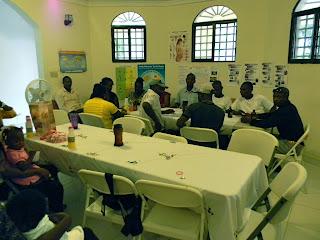 |
| Some of the staff waiting for the rest to arrive. |
Only a few days left before heading to the “other side,” as
Haitians like to refer to the United States. I have been letting everyone down
here that I know that I will be leaving this week. My friends and acquaintances
ask, “forever?” No, I will always be coming back and that is the truth.
 |
| Marie and her 4mth old! She works on our mobile clinic. |
Brittany has been doing a fabulous job taking all of the
inherited roles and responsibilities in stride. We have been skipping between meetings,
errands in town, and to the gritty details of the “how-to” of the daily and
monthly routines. I remember how everything had been so new to me – the sights,
the language, the people and customs. The experience of delving into a new
culture and learning on-the-job is irreplaceable. I do believe that this year
in Haiti has been the best year of my life yet in terms of growth and
self-realization. I couldn’t have asked for a better organization, staff, and
introduction to Haitian culture.
 |
| Posing with all but one of the mobile clinic staff. |
So, now that it is time to pack up my bags, I am feeling a
bit overwhelmed by the realization of going through another change... acclimating to life in the U.S. I am anticipating the transition, and so I plan to keep busy as soon as I arrive. Nothing like starting a new job to keep your mind preoccupied!
 |
| Eliot (cleaning lady), Solimen (cook), and Dieuny (cook). |
Today, Father's Day, I scheduled a staff party for the Midwives For Haiti in-country staff. MFH has parties every so often to celebrate the midwives, the students, etc. but never just the staff (at least not since I have been here)! So, I felt that it was important to recognize the people who do all of the behind-the-scenes work. The ones who aren't necessarily catching babies and attending to pregnant women, but the ones who make it all happen in between. I've included some pictures! The afternoon went very well (though we did start an hour and a half late). Here I am one year in Haiti, and I still expect people to come on time!
 |
| My good friend Mirline, one of our instructors. She is a nurse midwife. |
 |
| Just about all of our translators. They spend hours following our midwives and nurses in hot and sticky hospitals and clinics. |
How do I describe the wave of emotions while telling all of my colleagues how life-changing they have been to me? I did make it through my speech tear-free, but I so wanted to reach out to every one of my Haitian friends with open arms. Mwen genyen yon plac nan kè mwen pou chak moun. I have a place in my heart for each person. Thank you Midwives For Haiti. Thank you Haiti and to everyone that I mentioned today. Brittany, you will do a great job. I have no doubts. Thank you to my followers for your support. This is my last post.





